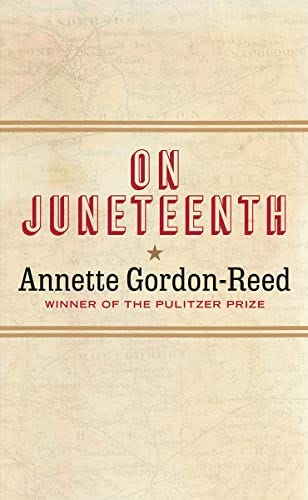On Juneteenth
a Book Review of the Essay Collection by Annette Gordon-Reed
Contains Spoilers (as far as you can spoil an essay collection)
On Juneteenth is a short essay collection by Annette Gordon-Reed that focuses on Gordon-Reed’s convoluted love for Texas. The narrative is told through vignettes of Gordon-Reed’s life and brief history lessons. On Juneteenth was on the New York Times Top 10 books of 2021, but it’s definitely not in my top 10; not that it wasn’t good, or even that I didn’t learn anything, it’s just that the thesis and essays are not spectacularly written or particularly inventive.
This short book is an ode to Texas, the flawed state that Gordon-Reed loves. I grew up in California, so I was raised to think that Texas is filled with Republican heathens (as they are taught Californians are toxic hippies). But Gordon-Reed discusses why she loves Texas, not in spite of the flaws, but with respect for the state’s complex history. While reading On Juneteenth I learned to appreciate some of culture and history of the state. Gordon-Reed’s love for Texas mostly originates from her experiences growing up and living there; the stories that most epitomize her complex feelings are her focus.
Gordon-Reed’s most interesting essay in the series is her first, in which she describes her experience as the first black student at her school a couple years after Brown vs. Board of Education. The other essays in On Juneteenth are extremely topical. One essay talks about Black people’s complex relationships with other people of color in the United States. Specifically, Gordon-Reed writes about how Native Americans sold Black people into slavery. Gordon-Reed argues that it is a disservice to society to forget race conflicts between oppressed groups because it is a reminder of how power can create stratification within vulnerable groups. Another essay focuses on the lives of Black people in early America who were not slaves, and how their lack of representation in media and education is obstructive because it minimizes the roles of Black people in history and confines their role to slavery alone. Oh, and she talks about Juneteenth, it’s origin in history and her life.
Gordon-Reed also touches on some extremely on controversial topics, but then she skirts away from them without directly addressing them. For example, the internet, especially Twitter, cancels a new person every day because of their background, history, or non-radically left perspective. Gordon-Reed elaborates on this instinct by describing a contradiction — people want to believe their historical heroes are morally upright, although conventional opinions or actions from the hero’s time period may put them on the wrong side of the issue of race.
“People want the individuals form the past they admire to be “right” on the question of race — no matter how wrong they actually were — so that admiring such people poses no problem. The difficulty is that not many European-Americans in the eighteenth and nineteenth centuries were what we could consider to be “right” on the question of race, which, at a minimum, requires believing in the equal humanity of African Americans” (Pg 116)
But instead of facing the contradiction head on and providing interesting insights about how to deal with the conflict she says that she admires writers who tackle these topics and “Being a historian…requires a degree of detachment. (Pg 116) ”
It was Gordon-Reed’s explicit goal to use this essay collection to discuss Texas’s strengths and weaknesses:
“About the difficulties of Texas: Love does not require taking an uncritical stance toward the object of one’s affections. In truth, it often requires the opposite. We can’t be of real service to the hopes we have for places — people, ourselves included — without a clear-eyed assessment of their (and our) strengths and weaknesses. That often demands a willingness to be critical, sometimes deeply so. How that is done matters, of course. Striking the right balance can be exceedingly hard. I hope I have achieved the proper equilibrium.” (Pg 141)
I think that this essay collection was extremely balanced, which is why it was underwhelming. I didn’t get very much out of it except that Texas is good in some ways. This essay collection does differentiate itself by not taking a radical perspective, it is not controversial or particularly exciting. It exists in a state of nuance; it does not take a stance. So, in other words, it’s pretty boring. And simultaneously refreshing in this world of hyper-polarized media.
The Don’t Call Me Ishmael Official Book Rating, Sponsored by Whales Center-Left of the Pacific:
3/5 Whales. Readable.



